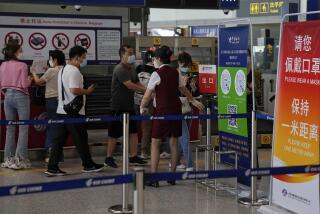China Will Let Citizens Begin Investing Abroad
- Share via
SHANGHAI — China’s government said today that it would allow companies and individuals to invest overseas for the first time, a policy change that has broad implications for U.S. and global financial markets and eventually could lead to a market-based value for China’s currency, the yuan.
“It’s actually huge,” said Stephen Green, an economist at Standard Chartered Bank in Shanghai. “It’s the beginning of a wave of Chinese global investment.”
The announcement by China’s central bank surprised analysts. It came a week before President Hu Jintao’s planned visit to the United States.
The move isn’t expected to immediately strengthen China’s currency, something American officials have called for with increasing vigor.
However, Chinese economists said the policy shift was another step toward an eventual free-floating currency, which probably would increase in its value.
“Obviously, this is related to the consistent pressure from America before Hu’s incoming visit,” said Sun Di, senior consultant at the Reorganization Office of China Construction Bank, one of the country’s four biggest banks.
U.S. politicians and businesses have complained that the yuan is kept artificially undervalued, giving Chinese exporters an advantage in overseas markets and contributing to the United States’ growing trade deficit with China.
Speaking Thursday at a small-business conference in Washington, President Bush again said China needed to do more to address the trade imbalance by improving intellectual property rights enforcement and moving toward a flexible market-based currency system.
Also, in a letter released Thursday, four Democratic governors urged Treasury Secretary John Snow to take immediate steps to brand China a currency manipulator if it didn’t quickly and substantially revalue the yuan. Beijing allowed it to appreciate by 2.1% in July.
Tony Fratto, a U.S. Treasury spokesman, said Thursday that the Bush administration viewed China’s move as a “positive development.”
But, he said, Beijing still needed to take other steps, including allowing more flexibility in its currency regime.
Chinese analysts applauded the government’s easing of controls on investment as a sounder policy than an outright strengthening of the currency, which Beijing worries could destabilize its economy and fragile banking system.
The changes take effect May 1 and will allow purchase of overseas stocks and foreign currency. An individual would be allowed to buy up to $20,000 in foreign exchange annually.
Increased trading in currencies, and the structure to allow the trade, could lead to a further loosening of policy and eventually to an untethered yuan.
At the moment, Chinese households, which on average save a third of their incomes, have limited investment options. Most put their savings into banks, which offer an interest rate of about 2% or less.
“This might increase people’s motive to hold more foreign currency, thus largely decreasing our country’s risk on foreign currency,” said Yi Xianrong, an international finance specialist at the Chinese Academy of Social Sciences.
Individuals holding foreign currencies would end up assuming some of the risk now held by the government.
China’s large inflow of foreign investments, coupled with the nation’s huge trade surplus, has pushed its foreign exchange reserves to more than $853 billion, overtaking Japan as the world’s largest.
Green, the Standard Chartered economist, said Chinese private investments could affect the prices of U.S. Treasuries and other assets.
Cao Jun of The Times’ Shanghai Bureau and Times staff writer Evelyn Iritani contributed to this report.
More to Read
Sign up for Essential California
The most important California stories and recommendations in your inbox every morning.
You may occasionally receive promotional content from the Los Angeles Times.














